Compensation Philosophy: A Strategic Analysis of Citigroup Inc. US
VerifiedAdded on 2023/04/22
|8
|1282
|490
Report
AI Summary
This report analyzes leading, lagging, and meeting compensation strategies within a company's compensation philosophy, focusing on Citigroup Inc. US. It discusses the benefits and risks associated with each strategy, including the impact on payroll expenses, employee retention, and the ability to attract qualified workforce. The report identifies that Citigroup employs a meeting strategy, rewarding employees based on performance while maintaining competitive pay. While this approach helps retain employees, the report suggests that Citigroup should consider additional measures to attract highly experienced individuals who seek higher salaries. The analysis concludes that Citigroup's current compensation strategy aligns with its objectives but could be enhanced to improve its ability to attract top-tier talent.
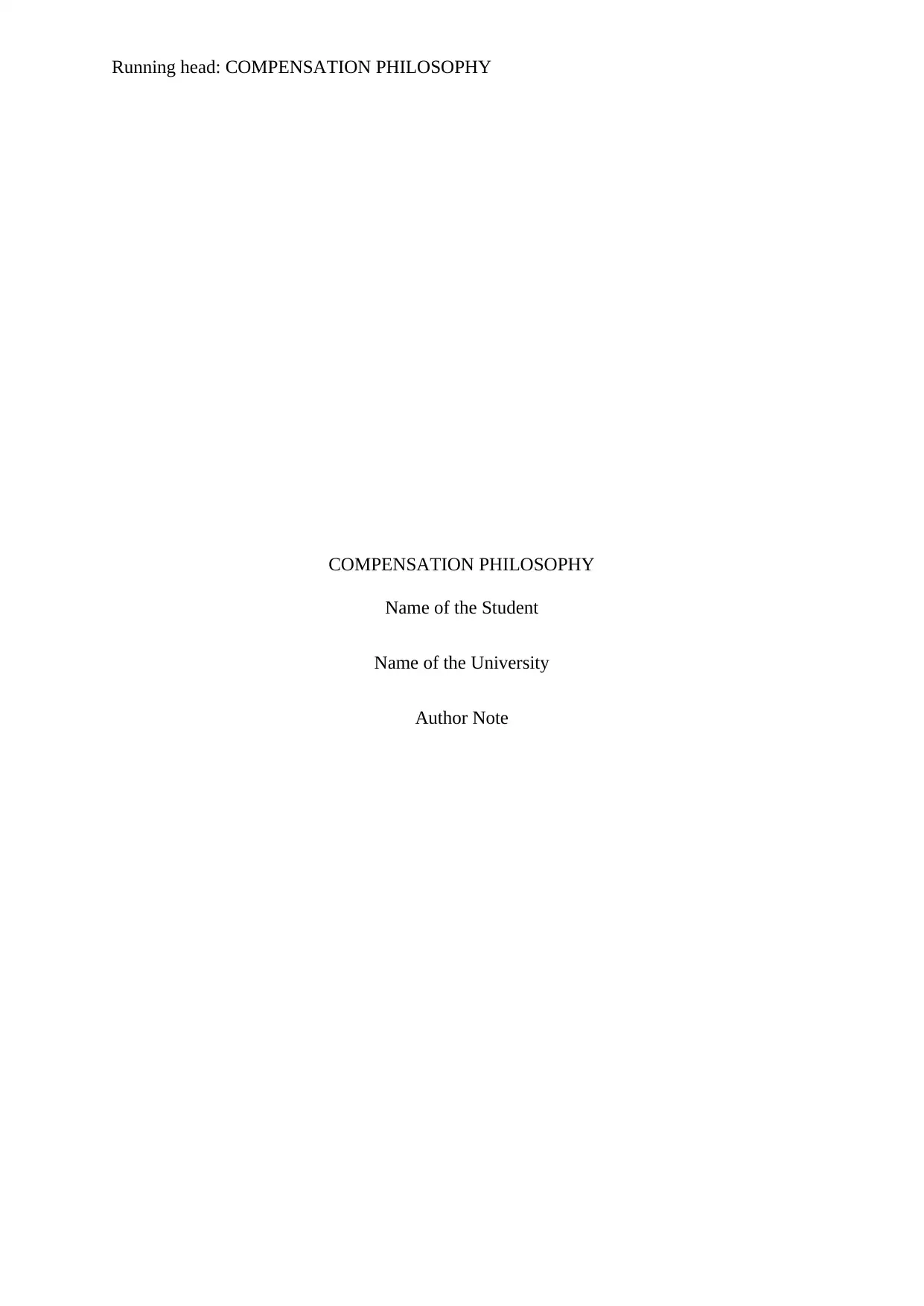
Running head: COMPENSATION PHILOSOPHY
COMPENSATION PHILOSOPHY
Name of the Student
Name of the University
Author Note
COMPENSATION PHILOSOPHY
Name of the Student
Name of the University
Author Note
Paraphrase This Document
Need a fresh take? Get an instant paraphrase of this document with our AI Paraphraser
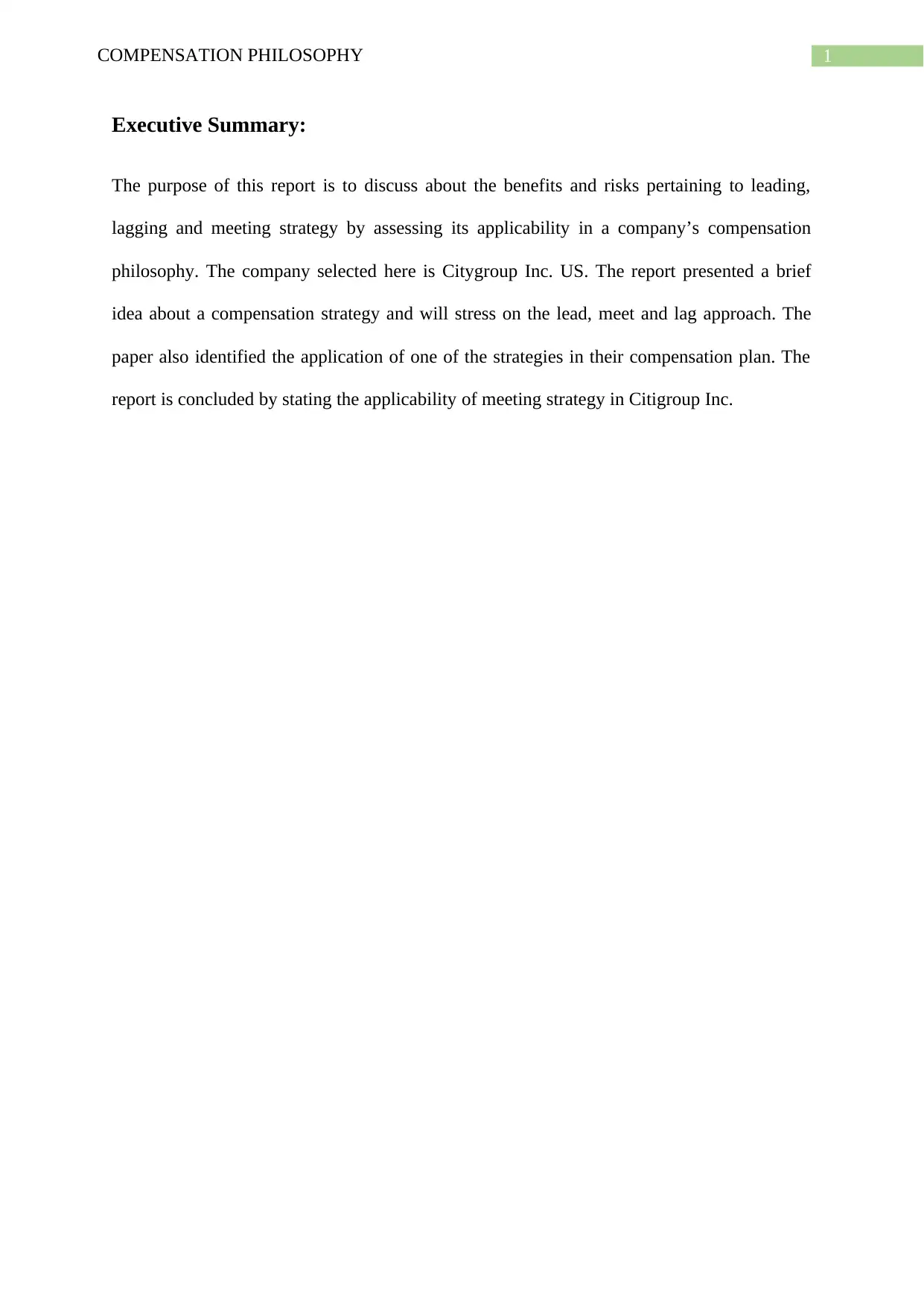
1COMPENSATION PHILOSOPHY
Executive Summary:
The purpose of this report is to discuss about the benefits and risks pertaining to leading,
lagging and meeting strategy by assessing its applicability in a company’s compensation
philosophy. The company selected here is Citygroup Inc. US. The report presented a brief
idea about a compensation strategy and will stress on the lead, meet and lag approach. The
paper also identified the application of one of the strategies in their compensation plan. The
report is concluded by stating the applicability of meeting strategy in Citigroup Inc.
Executive Summary:
The purpose of this report is to discuss about the benefits and risks pertaining to leading,
lagging and meeting strategy by assessing its applicability in a company’s compensation
philosophy. The company selected here is Citygroup Inc. US. The report presented a brief
idea about a compensation strategy and will stress on the lead, meet and lag approach. The
paper also identified the application of one of the strategies in their compensation plan. The
report is concluded by stating the applicability of meeting strategy in Citigroup Inc.
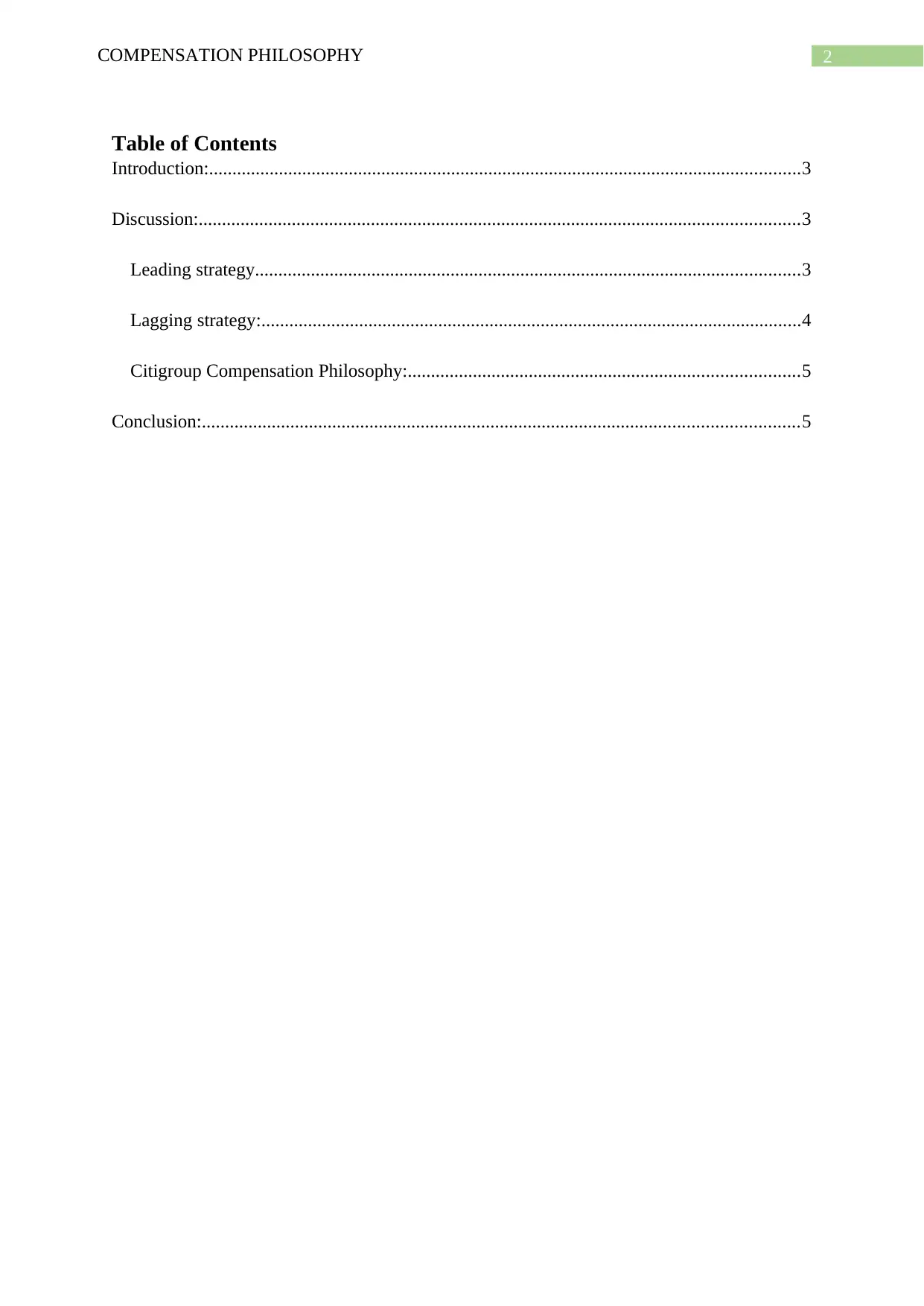
2COMPENSATION PHILOSOPHY
Table of Contents
Introduction:...............................................................................................................................3
Discussion:.................................................................................................................................3
Leading strategy.....................................................................................................................3
Lagging strategy:....................................................................................................................4
Citigroup Compensation Philosophy:....................................................................................5
Conclusion:................................................................................................................................5
Table of Contents
Introduction:...............................................................................................................................3
Discussion:.................................................................................................................................3
Leading strategy.....................................................................................................................3
Lagging strategy:....................................................................................................................4
Citigroup Compensation Philosophy:....................................................................................5
Conclusion:................................................................................................................................5
⊘ This is a preview!⊘
Do you want full access?
Subscribe today to unlock all pages.

Trusted by 1+ million students worldwide
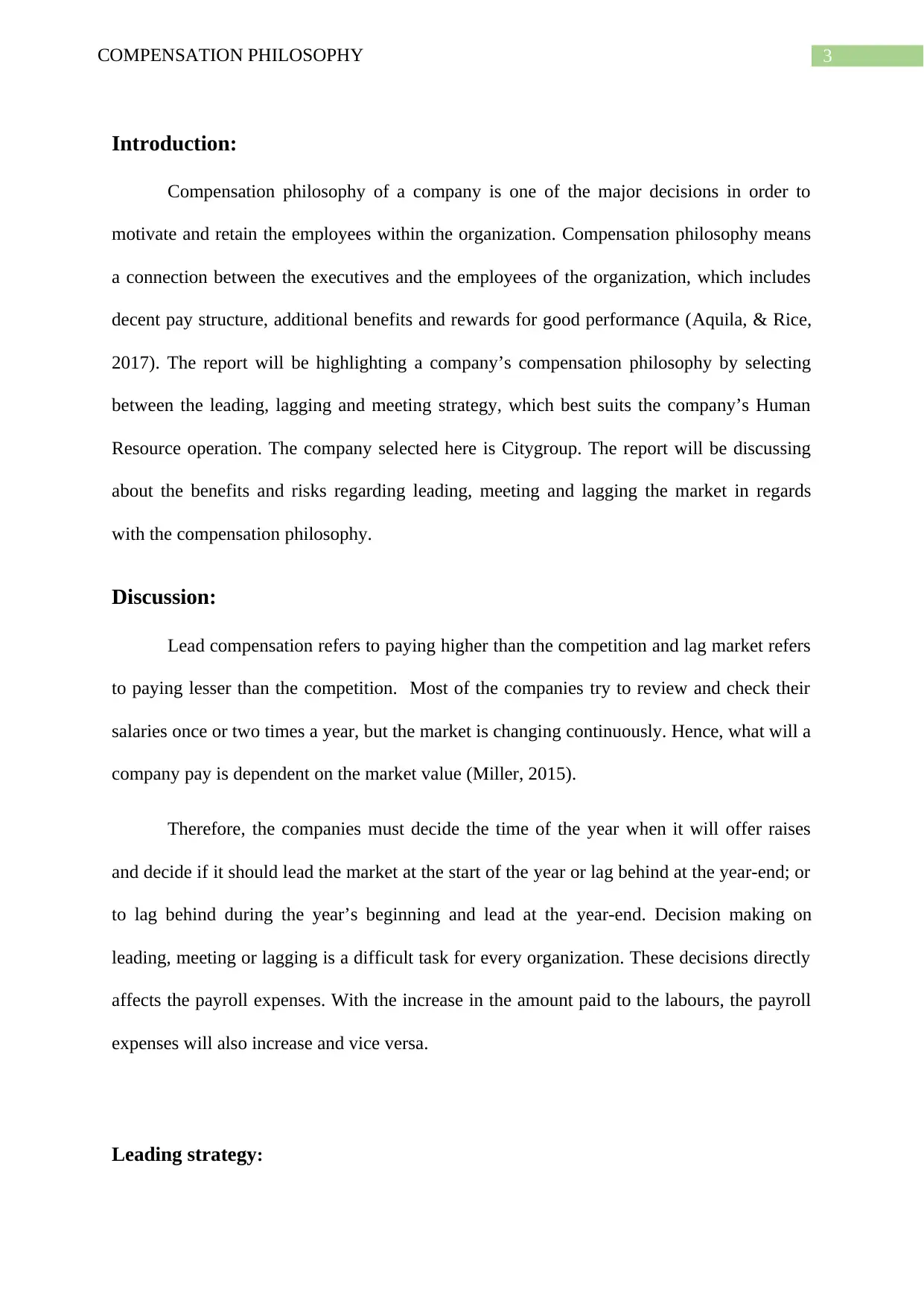
3COMPENSATION PHILOSOPHY
Introduction:
Compensation philosophy of a company is one of the major decisions in order to
motivate and retain the employees within the organization. Compensation philosophy means
a connection between the executives and the employees of the organization, which includes
decent pay structure, additional benefits and rewards for good performance (Aquila, & Rice,
2017). The report will be highlighting a company’s compensation philosophy by selecting
between the leading, lagging and meeting strategy, which best suits the company’s Human
Resource operation. The company selected here is Citygroup. The report will be discussing
about the benefits and risks regarding leading, meeting and lagging the market in regards
with the compensation philosophy.
Discussion:
Lead compensation refers to paying higher than the competition and lag market refers
to paying lesser than the competition. Most of the companies try to review and check their
salaries once or two times a year, but the market is changing continuously. Hence, what will a
company pay is dependent on the market value (Miller, 2015).
Therefore, the companies must decide the time of the year when it will offer raises
and decide if it should lead the market at the start of the year or lag behind at the year-end; or
to lag behind during the year’s beginning and lead at the year-end. Decision making on
leading, meeting or lagging is a difficult task for every organization. These decisions directly
affects the payroll expenses. With the increase in the amount paid to the labours, the payroll
expenses will also increase and vice versa.
Leading strategy:
Introduction:
Compensation philosophy of a company is one of the major decisions in order to
motivate and retain the employees within the organization. Compensation philosophy means
a connection between the executives and the employees of the organization, which includes
decent pay structure, additional benefits and rewards for good performance (Aquila, & Rice,
2017). The report will be highlighting a company’s compensation philosophy by selecting
between the leading, lagging and meeting strategy, which best suits the company’s Human
Resource operation. The company selected here is Citygroup. The report will be discussing
about the benefits and risks regarding leading, meeting and lagging the market in regards
with the compensation philosophy.
Discussion:
Lead compensation refers to paying higher than the competition and lag market refers
to paying lesser than the competition. Most of the companies try to review and check their
salaries once or two times a year, but the market is changing continuously. Hence, what will a
company pay is dependent on the market value (Miller, 2015).
Therefore, the companies must decide the time of the year when it will offer raises
and decide if it should lead the market at the start of the year or lag behind at the year-end; or
to lag behind during the year’s beginning and lead at the year-end. Decision making on
leading, meeting or lagging is a difficult task for every organization. These decisions directly
affects the payroll expenses. With the increase in the amount paid to the labours, the payroll
expenses will also increase and vice versa.
Leading strategy:
Paraphrase This Document
Need a fresh take? Get an instant paraphrase of this document with our AI Paraphraser
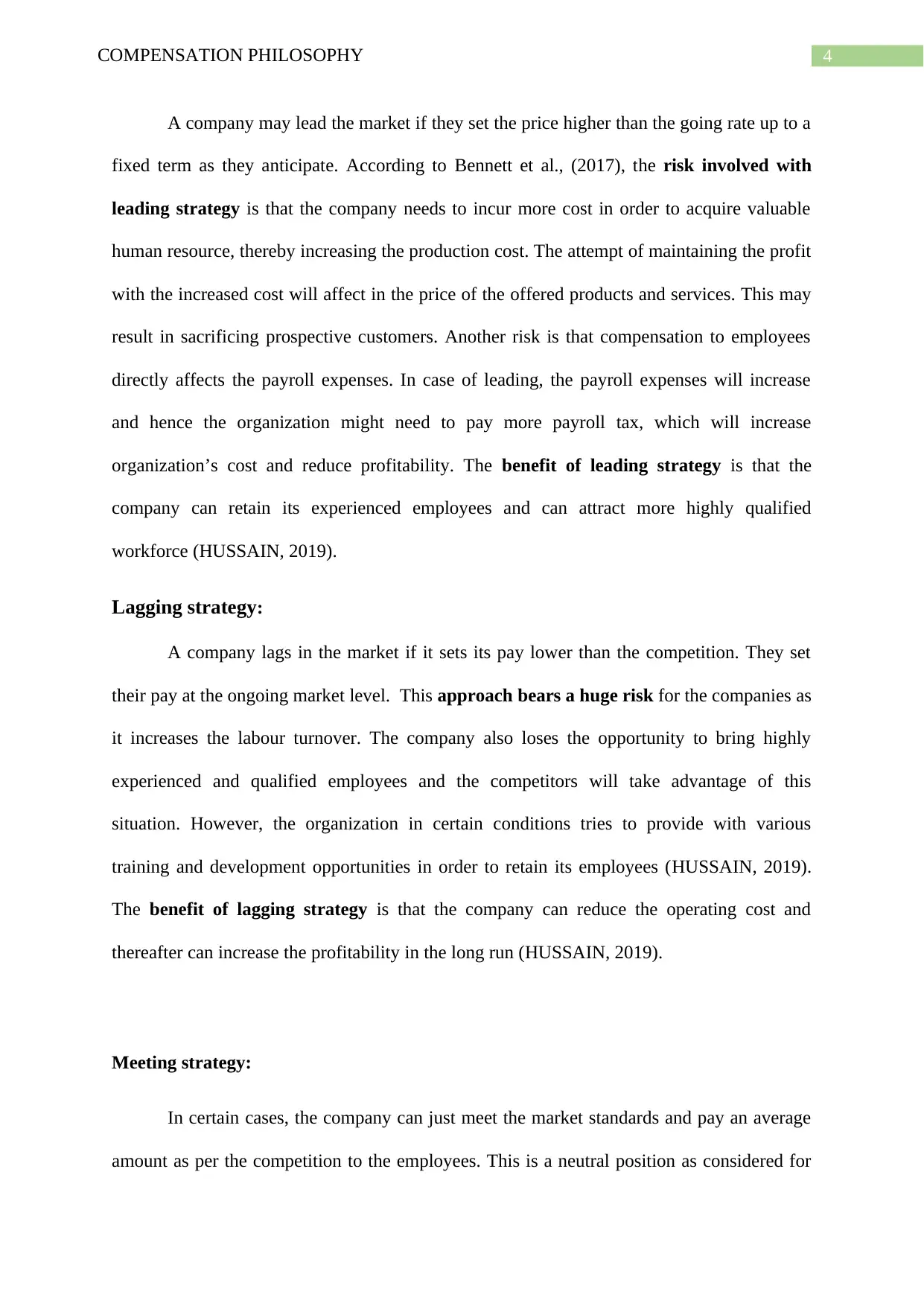
4COMPENSATION PHILOSOPHY
A company may lead the market if they set the price higher than the going rate up to a
fixed term as they anticipate. According to Bennett et al., (2017), the risk involved with
leading strategy is that the company needs to incur more cost in order to acquire valuable
human resource, thereby increasing the production cost. The attempt of maintaining the profit
with the increased cost will affect in the price of the offered products and services. This may
result in sacrificing prospective customers. Another risk is that compensation to employees
directly affects the payroll expenses. In case of leading, the payroll expenses will increase
and hence the organization might need to pay more payroll tax, which will increase
organization’s cost and reduce profitability. The benefit of leading strategy is that the
company can retain its experienced employees and can attract more highly qualified
workforce (HUSSAIN, 2019).
Lagging strategy:
A company lags in the market if it sets its pay lower than the competition. They set
their pay at the ongoing market level. This approach bears a huge risk for the companies as
it increases the labour turnover. The company also loses the opportunity to bring highly
experienced and qualified employees and the competitors will take advantage of this
situation. However, the organization in certain conditions tries to provide with various
training and development opportunities in order to retain its employees (HUSSAIN, 2019).
The benefit of lagging strategy is that the company can reduce the operating cost and
thereafter can increase the profitability in the long run (HUSSAIN, 2019).
Meeting strategy:
In certain cases, the company can just meet the market standards and pay an average
amount as per the competition to the employees. This is a neutral position as considered for
A company may lead the market if they set the price higher than the going rate up to a
fixed term as they anticipate. According to Bennett et al., (2017), the risk involved with
leading strategy is that the company needs to incur more cost in order to acquire valuable
human resource, thereby increasing the production cost. The attempt of maintaining the profit
with the increased cost will affect in the price of the offered products and services. This may
result in sacrificing prospective customers. Another risk is that compensation to employees
directly affects the payroll expenses. In case of leading, the payroll expenses will increase
and hence the organization might need to pay more payroll tax, which will increase
organization’s cost and reduce profitability. The benefit of leading strategy is that the
company can retain its experienced employees and can attract more highly qualified
workforce (HUSSAIN, 2019).
Lagging strategy:
A company lags in the market if it sets its pay lower than the competition. They set
their pay at the ongoing market level. This approach bears a huge risk for the companies as
it increases the labour turnover. The company also loses the opportunity to bring highly
experienced and qualified employees and the competitors will take advantage of this
situation. However, the organization in certain conditions tries to provide with various
training and development opportunities in order to retain its employees (HUSSAIN, 2019).
The benefit of lagging strategy is that the company can reduce the operating cost and
thereafter can increase the profitability in the long run (HUSSAIN, 2019).
Meeting strategy:
In certain cases, the company can just meet the market standards and pay an average
amount as per the competition to the employees. This is a neutral position as considered for
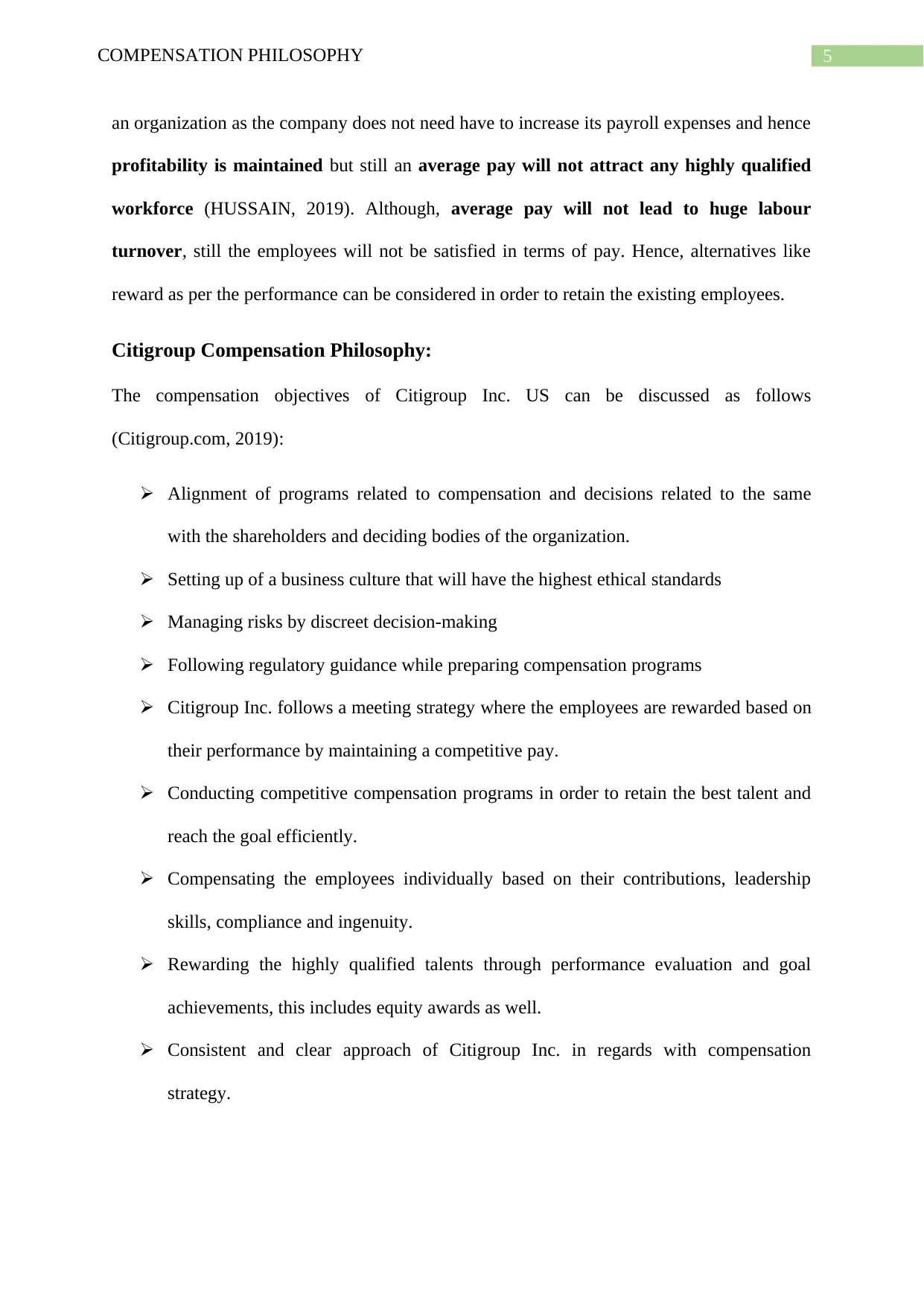
5COMPENSATION PHILOSOPHY
an organization as the company does not need have to increase its payroll expenses and hence
profitability is maintained but still an average pay will not attract any highly qualified
workforce (HUSSAIN, 2019). Although, average pay will not lead to huge labour
turnover, still the employees will not be satisfied in terms of pay. Hence, alternatives like
reward as per the performance can be considered in order to retain the existing employees.
Citigroup Compensation Philosophy:
The compensation objectives of Citigroup Inc. US can be discussed as follows
(Citigroup.com, 2019):
Alignment of programs related to compensation and decisions related to the same
with the shareholders and deciding bodies of the organization.
Setting up of a business culture that will have the highest ethical standards
Managing risks by discreet decision-making
Following regulatory guidance while preparing compensation programs
Citigroup Inc. follows a meeting strategy where the employees are rewarded based on
their performance by maintaining a competitive pay.
Conducting competitive compensation programs in order to retain the best talent and
reach the goal efficiently.
Compensating the employees individually based on their contributions, leadership
skills, compliance and ingenuity.
Rewarding the highly qualified talents through performance evaluation and goal
achievements, this includes equity awards as well.
Consistent and clear approach of Citigroup Inc. in regards with compensation
strategy.
an organization as the company does not need have to increase its payroll expenses and hence
profitability is maintained but still an average pay will not attract any highly qualified
workforce (HUSSAIN, 2019). Although, average pay will not lead to huge labour
turnover, still the employees will not be satisfied in terms of pay. Hence, alternatives like
reward as per the performance can be considered in order to retain the existing employees.
Citigroup Compensation Philosophy:
The compensation objectives of Citigroup Inc. US can be discussed as follows
(Citigroup.com, 2019):
Alignment of programs related to compensation and decisions related to the same
with the shareholders and deciding bodies of the organization.
Setting up of a business culture that will have the highest ethical standards
Managing risks by discreet decision-making
Following regulatory guidance while preparing compensation programs
Citigroup Inc. follows a meeting strategy where the employees are rewarded based on
their performance by maintaining a competitive pay.
Conducting competitive compensation programs in order to retain the best talent and
reach the goal efficiently.
Compensating the employees individually based on their contributions, leadership
skills, compliance and ingenuity.
Rewarding the highly qualified talents through performance evaluation and goal
achievements, this includes equity awards as well.
Consistent and clear approach of Citigroup Inc. in regards with compensation
strategy.
⊘ This is a preview!⊘
Do you want full access?
Subscribe today to unlock all pages.

Trusted by 1+ million students worldwide
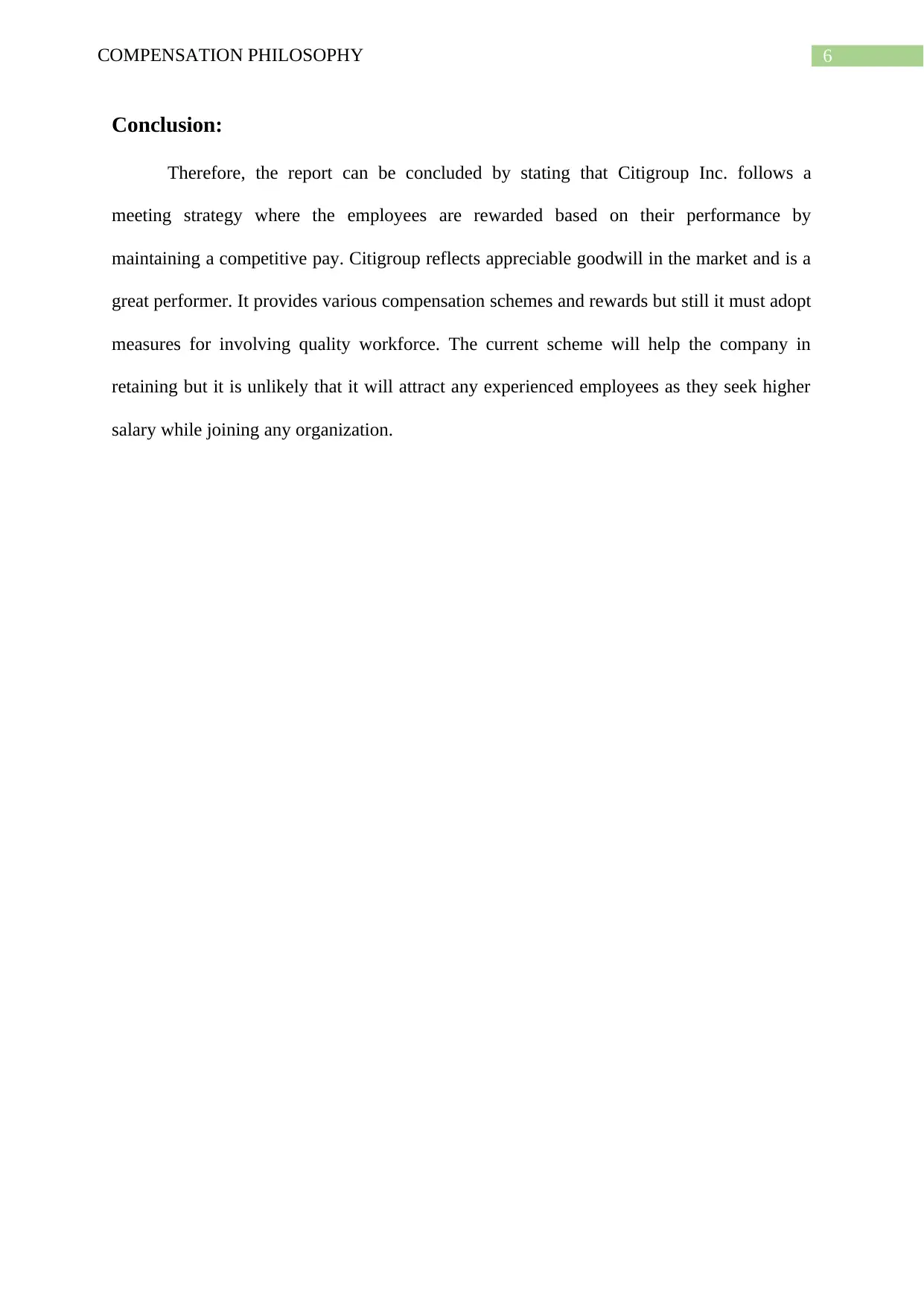
6COMPENSATION PHILOSOPHY
Conclusion:
Therefore, the report can be concluded by stating that Citigroup Inc. follows a
meeting strategy where the employees are rewarded based on their performance by
maintaining a competitive pay. Citigroup reflects appreciable goodwill in the market and is a
great performer. It provides various compensation schemes and rewards but still it must adopt
measures for involving quality workforce. The current scheme will help the company in
retaining but it is unlikely that it will attract any experienced employees as they seek higher
salary while joining any organization.
Conclusion:
Therefore, the report can be concluded by stating that Citigroup Inc. follows a
meeting strategy where the employees are rewarded based on their performance by
maintaining a competitive pay. Citigroup reflects appreciable goodwill in the market and is a
great performer. It provides various compensation schemes and rewards but still it must adopt
measures for involving quality workforce. The current scheme will help the company in
retaining but it is unlikely that it will attract any experienced employees as they seek higher
salary while joining any organization.
Paraphrase This Document
Need a fresh take? Get an instant paraphrase of this document with our AI Paraphraser
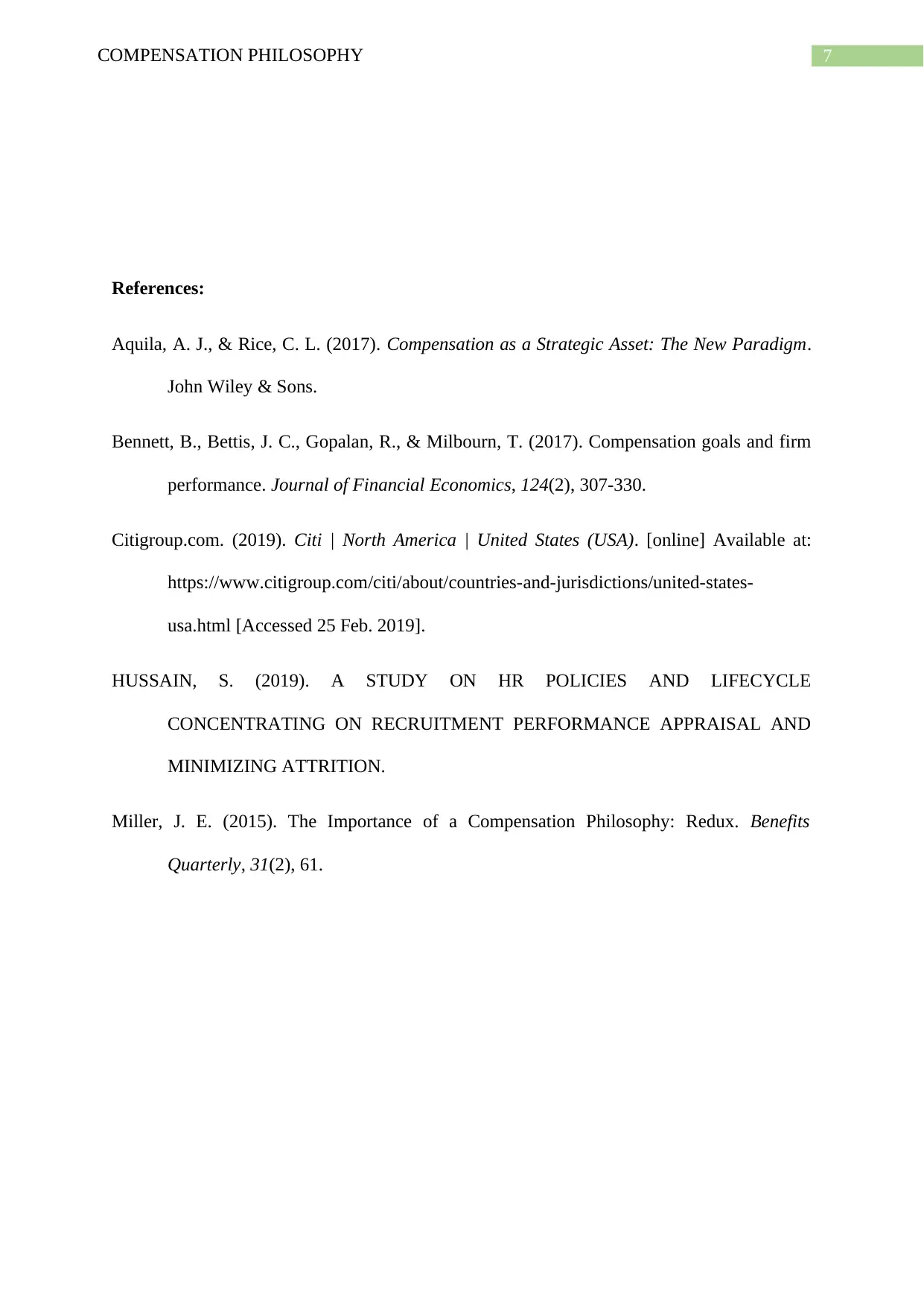
7COMPENSATION PHILOSOPHY
References:
Aquila, A. J., & Rice, C. L. (2017). Compensation as a Strategic Asset: The New Paradigm.
John Wiley & Sons.
Bennett, B., Bettis, J. C., Gopalan, R., & Milbourn, T. (2017). Compensation goals and firm
performance. Journal of Financial Economics, 124(2), 307-330.
Citigroup.com. (2019). Citi | North America | United States (USA). [online] Available at:
https://www.citigroup.com/citi/about/countries-and-jurisdictions/united-states-
usa.html [Accessed 25 Feb. 2019].
HUSSAIN, S. (2019). A STUDY ON HR POLICIES AND LIFECYCLE
CONCENTRATING ON RECRUITMENT PERFORMANCE APPRAISAL AND
MINIMIZING ATTRITION.
Miller, J. E. (2015). The Importance of a Compensation Philosophy: Redux. Benefits
Quarterly, 31(2), 61.
References:
Aquila, A. J., & Rice, C. L. (2017). Compensation as a Strategic Asset: The New Paradigm.
John Wiley & Sons.
Bennett, B., Bettis, J. C., Gopalan, R., & Milbourn, T. (2017). Compensation goals and firm
performance. Journal of Financial Economics, 124(2), 307-330.
Citigroup.com. (2019). Citi | North America | United States (USA). [online] Available at:
https://www.citigroup.com/citi/about/countries-and-jurisdictions/united-states-
usa.html [Accessed 25 Feb. 2019].
HUSSAIN, S. (2019). A STUDY ON HR POLICIES AND LIFECYCLE
CONCENTRATING ON RECRUITMENT PERFORMANCE APPRAISAL AND
MINIMIZING ATTRITION.
Miller, J. E. (2015). The Importance of a Compensation Philosophy: Redux. Benefits
Quarterly, 31(2), 61.
1 out of 8
Related Documents
Your All-in-One AI-Powered Toolkit for Academic Success.
+13062052269
info@desklib.com
Available 24*7 on WhatsApp / Email
![[object Object]](/_next/static/media/star-bottom.7253800d.svg)
Unlock your academic potential
Copyright © 2020–2026 A2Z Services. All Rights Reserved. Developed and managed by ZUCOL.




